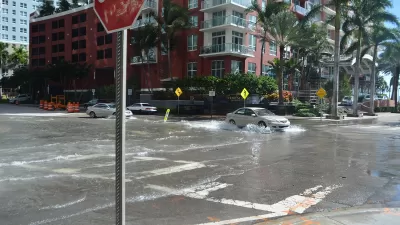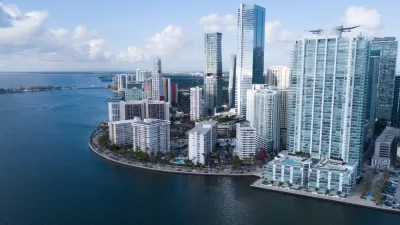Three years after its adoption, Sean McCaughan assesses the impact of Miami 21, first New Urbanist zoning code adopted by a major American city.
Miami 21, authored by Miami based New Urbanist leaders Elizabeth Plater-Zyberk and Andres Duany, was the firm's attempt to translate their policies, which had largely been tested at the suburban scale, to a fully urban environment, in their own backyard. McCaughan sees successes and failures at this early junction.
Of the failures, McCaughan sites the lack of adequate mass transit to support walkability, the design of the new Miami Marlins ballpark, and the lack of reduction in parking requirements. "The code is not complete. Miami 21 is stymied by the fact that it is not a code for a complete city, but only for its zoning. Miami's lack of quality mass transit is one of the city's worst obstacles to growth, and yet transportation planning was firmly beyond their jurisdiction. The long battle to enact the code also led to compromises and conformity on such matters as parking requirements."
McCaughan sees the code's early successes at a finer grain. "The strength of Miami 21 is not in big moves, like rail lines, or iconic public buildings. Miami 21's power is urban infill, density, and the vitality of the pedestrian experience at the neighborhood level."
FULL STORY: Comment> Miami's New Urbanist Experiment

Planetizen Federal Action Tracker
A weekly monitor of how Trump’s orders and actions are impacting planners and planning in America.

Chicago’s Ghost Rails
Just beneath the surface of the modern city lie the remnants of its expansive early 20th-century streetcar system.

San Antonio and Austin are Fusing Into one Massive Megaregion
The region spanning the two central Texas cities is growing fast, posing challenges for local infrastructure and water supplies.

Since Zion's Shuttles Went Electric “The Smog is Gone”
Visitors to Zion National Park can enjoy the canyon via the nation’s first fully electric park shuttle system.

Trump Distributing DOT Safety Funds at 1/10 Rate of Biden
Funds for Safe Streets and other transportation safety and equity programs are being held up by administrative reviews and conflicts with the Trump administration’s priorities.

German Cities Subsidize Taxis for Women Amid Wave of Violence
Free or low-cost taxi rides can help women navigate cities more safely, but critics say the programs don't address the root causes of violence against women.
Urban Design for Planners 1: Software Tools
This six-course series explores essential urban design concepts using open source software and equips planners with the tools they need to participate fully in the urban design process.
Planning for Universal Design
Learn the tools for implementing Universal Design in planning regulations.
planning NEXT
Appalachian Highlands Housing Partners
Mpact (founded as Rail~Volution)
City of Camden Redevelopment Agency
City of Astoria
City of Portland
City of Laramie





























